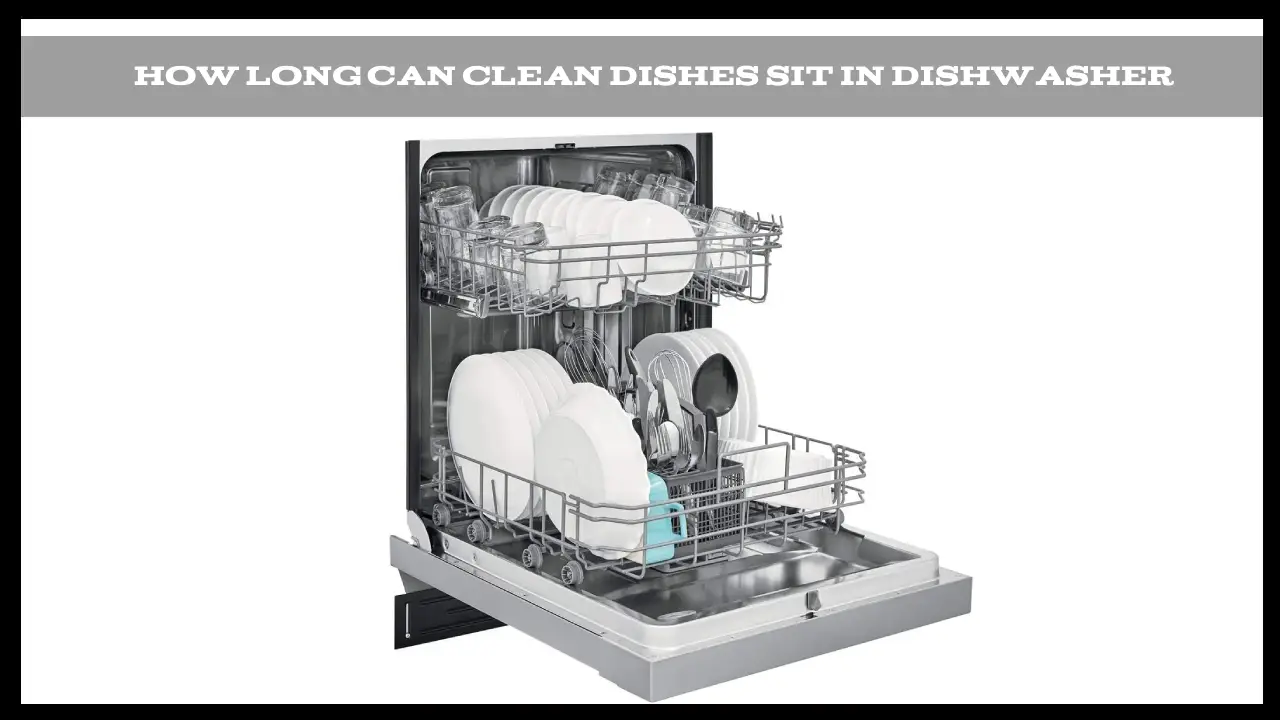The convenience of modern dishwashers has revolutionized kitchen cleanup, making it easier than ever to maintain a spotless kitchen with minimal effort. However, one common question that many of us face is: “How long can clean dishes sit in the dishwasher?” While it might seem harmless to leave clean dishes in the dishwasher, several factors should be considered to ensure that your dishes remain hygienic and your appliance functions efficiently.
Table of Contents
How Long Can Clean Dishes Sit in the Dishwasher?
Clean dishes can sit in a dishwasher for several hours to a day without any significant issues, especially if the dishwasher has a drying cycle that helps keep them dry. However, it’s best to avoid leaving them for too long, as moisture can lead to the development of odors or even mold, particularly if the dishwasher is not completely sealed.
If you anticipate needing extra time before unloading the clean dishes, consider using the sanitize or dry setting on your dishwasher before closing it. This can help ensure that any residual moisture is minimized. Ideally, try to unload the dishwasher within 24 hours to maintain optimal cleanliness and freshness.

The Immediate Post-Cycle Period: Ideal Time to Unload
When your dishwasher completes its cycle, the best practice is to unload it as soon as possible. During the drying phase, your dishes are still warm, and the residual heat helps evaporate any remaining moisture, leaving your dishes dry and ready to be put away. Unloading at this stage minimizes the risk of lingering moisture, which can lead to odors, bacteria growth, or even the warping of certain types of dishes, particularly wooden utensils or cutting boards.
Leaving Dishes Overnight: Acceptable, but Not Ideal
If you are unable to unload the dishwasher immediately after the cycle, leaving the clean dishes overnight is generally acceptable. However, it’s important to note that even a few hours of delay can lead to condensation forming on dishes, particularly if your dishwasher lacks a robust drying function. This moisture can create a breeding ground for bacteria and mold, particularly in more humid environments. Additionally, the longer dishes sit, the more likely it is that odors will develop, potentially from any food particles left in the dishwasher’s filter or from moisture trapped in crevices.
24-Hour Window: The Maximum Safe Period
While it’s not uncommon to leave clean dishes in the dishwasher for up to 24 hours, this should be considered the maximum safe period. After a full day, the risks of bacterial growth, unpleasant odors, and moisture-related damage to dishes increase significantly. Furthermore, leaving dishes in the dishwasher for extended periods can create an environment where mold and mildew can thrive, particularly if the dishwasher is not properly ventilated or the door is kept closed.

Beyond 24 Hours: Potential Risks and Consequences
Leaving dishes in the dishwasher for more than 24 hours can lead to several undesirable outcomes. The most concerning is the potential for bacterial growth, as a damp, enclosed environment is ideal for bacteria to multiply. This could compromise the cleanliness of your dishes, making them unsafe for use without another wash.
Additionally, the prolonged presence of moisture can cause damage to certain materials. Wooden items may warp or crack, and metal items, particularly those not made from stainless steel, may begin to corrode. Glassware, too, can become etched over time if it remains in contact with moisture or detergents, leading to a cloudy appearance.
Impact on Dishwasher Efficiency
Another factor to consider is the impact on your dishwasher itself. When dishes are left in the dishwasher for extended periods, any remaining food particles or moisture can cause the machine’s filter to clog or develop unpleasant odors. This can lead to reduced efficiency in future wash cycles and may even require more frequent cleaning or maintenance of the appliance.
Furthermore, the presence of clean dishes in the dishwasher may deter you from running another load, potentially leading to a backlog of dirty dishes and an increased likelihood of overloading the machine, which can compromise its cleaning performance.

Best Practices for Dishwasher Maintenance and Dish Hygiene
To maintain both your dishwasher and the cleanliness of your dishes, it is recommended to follow these best practices:
- Unload Promptly: Aim to unload the dishwasher as soon as possible after the cycle completes, ideally within a few hours. This helps prevent moisture from accumulating and reduces the risk of bacterial growth.
- Keep the Door Ajar: If you cannot unload the dishwasher immediately, leaving the door slightly ajar can help moisture escape, reducing the risk of mold and mildew development.
- Regular Cleaning: Clean your dishwasher’s filter and interior regularly to prevent the buildup of food particles and odors. This also ensures that your dishwasher operates efficiently.
- Avoid Overloading: Do not overload the dishwasher, as this can prevent proper cleaning and drying, leaving dishes more susceptible to moisture-related issues.
- Check for Residual Water: Before unloading, check for any residual water on your dishes. If necessary, use a clean towel to dry them off to prevent moisture from causing damage or harboring bacteria.
- Use a Quality Detergent: Invest in a high-quality dishwasher detergent that promotes thorough cleaning and drying, which can help reduce the likelihood of moisture remaining on dishes.
Conclusion
In conclusion, while it may be tempting to leave clean dishes in the dishwasher for extended periods, doing so can lead to several potential issues, including bacterial growth, unpleasant odors, and damage to your dishes or the dishwasher itself. The ideal practice is to unload your dishwasher promptly after the cycle completes, but if that is not possible, try to do so within 24 hours at most. By following the best practices outlined above, you can ensure that your dishes remain clean, dry, and ready for use while also prolonging the lifespan and efficiency of your dishwasher.

FAQs
1. How long can I leave clean dishes in the dishwasher?
You can leave clean dishes in the dishwasher for up to 24 hours. However, it’s best to unload them as soon as possible to avoid moisture buildup, bacterial growth, and unpleasant odors.
2. Is it okay to leave clean dishes in the dishwasher overnight?
Yes, it’s generally okay to leave clean dishes in the dishwasher overnight. Just be aware that condensation may form, which can create an environment conducive to bacteria and mold growth if left for too long.
3. What happens if I leave clean dishes in the dishwasher for more than 24 hours?
Leaving dishes in the dishwasher for more than 24 hours can lead to bacterial growth, mold development, and possible damage to certain dish materials like wood or metal. It can also cause unpleasant odors and affect the efficiency of your dishwasher.
4. Can I keep the dishwasher door closed after the cycle is complete?
It’s better to leave the dishwasher door slightly ajar after the cycle is complete if you cannot unload it immediately. This allows moisture to escape, reducing the risk of mold and mildew.
5. Will my dishes stay clean if I leave them in the dishwasher too long?
Dishes will generally remain clean for a short period after the cycle ends. However, if left too long, the damp environment can lead to bacterial growth, making it necessary to rewash them before use.
6. What should I do if I forget to unload the dishwasher for several days?
If you forget to unload the dishwasher for several days, it’s advisable to run another quick rinse cycle before unloading to ensure that any bacteria or odors are eliminated.
7. Can moisture damage my dishes if they sit in the dishwasher too long?
Yes, prolonged exposure to moisture can damage certain types of dishes, particularly wooden or metal items. It can cause wood to warp and metal to corrode. Glassware may also become cloudy over time.
8. How can I prevent odors in my dishwasher if I can’t unload it right away?
To prevent odors, clean the dishwasher filter regularly, leave the door ajar after the cycle to allow ventilation, and consider using a dishwasher cleaner periodically to keep it fresh.
9. Does leaving dishes in the dishwasher affect its performance?
Yes, leaving dishes in the dishwasher for extended periods can affect performance by causing food particles to clog the filter and allowing moisture to create an environment where mold and mildew can grow.
10. Is it necessary to dry dishes by hand if they sit in the dishwasher too long?
If you notice residual moisture on your dishes after they’ve sat in the dishwasher, it’s a good idea to dry them by hand to prevent any water spots, bacteria growth, or damage to the dishes.
These FAQs should help clarify common concerns about leaving clean dishes in the dishwasher and provide guidance for maintaining both dish and dishwasher hygiene.

